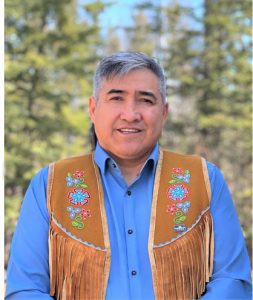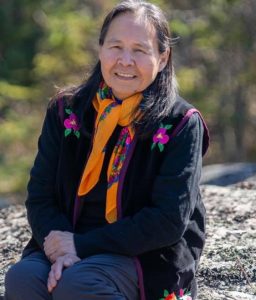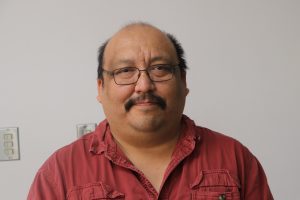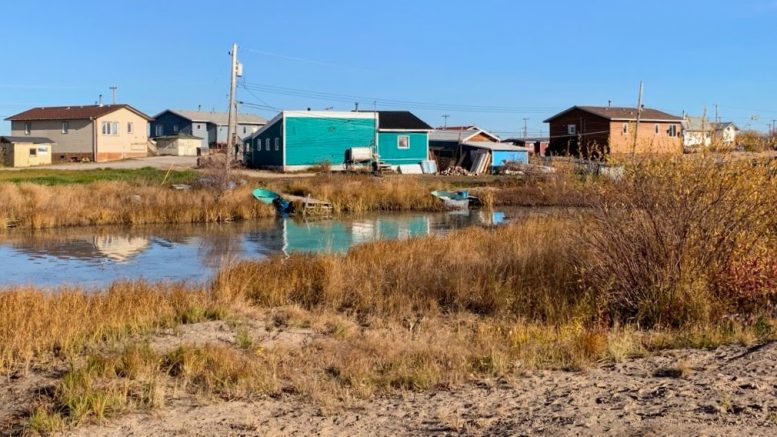CKLB reached out to each candidate for chief in the four Tłı̨chǫ communities.
The same three questions were asked to each candidate and here is what they had to say.
The transcription has been edited for clarity and accuracy.
Behchokǫ̀

Behchokǫ̀ Chief Clifford Daniels is running for re-election. (Photo from Facebook.)
Chief Chief Clifford Daniels
Q: Why are you running for re-election?
A: Previous experience and I have quite a bit of vast knowledge. All the work has been done in the community and government and also with Tłı̨chǫ Government.
There’s always more work to do, unfinished business, and so I’d like to continue that. Hopefully I get to use the office of new cultural center being built. So I still have more to offer this community, should I be given another four year term. And I think I’ll benefit the community and people as a whole, and move on to bigger, better things.
Q: What do you think is the biggest issue facing Behchokǫ̀ right now?
A: It has been gradually getting worse and worse, I think it’s the drug issue. Growing up it was more alcohol, and as time went by, I started to see the heavy drugs that are really affecting our youths. People really close and dear to us. Some really feel it at home, some struggle with it every day.
And housing has always been the big issue. The statistics show that Behchokǫ̀ is one of the worst throughout the territory, with a shortage of housing for the number of people have in the community. We have a large list of people on the waiting list that need to be accommodated.
Six single units are coming to Behchokǫ̀, but that doesn’t meet the needs of the community. So addiction is going to be one of the biggest things that we’re going to be tackling.
Just recently the Tłı̨chǫ Government and the assembly has passed to provide $3 million per year for five years, an addiction strategy rollout. And the other one, the same amount of money, $3 million per year for five years housing strategy plan that will be developed.
(Clarification: the $3 million will be shared between all four Tłı̨chǫ communities over five years.)
So the two main things that are affecting our community, and we know that it’s not just our community, and it’s all over, across Canada, those things we do struggle with. And so I would say that those things have to be tackled. One of the past leaders, Alex Arrowmaker, he made it clear that we have to really deal with the addiction issue.
I think that’s what we’re willing to do. And there’s always ongoing issues to things being developed as as we grow the community and ever changing government level.
Listen to Mary Rose Blackduck’s interview with Chief Clifford Daniels in Tłı̨chǫ Yati
Q: You mentioned the program with the Tłı̨chǫ Government for the addictions. What else would you do to address that issue, if you are re-elected chief?
A: We want to really develop support for these things that will be implemented at the community level, and possibly even have some type of facility in the community. Where our people can go to and those are the ones that are coming back from programs. So there’s there’s follow-up and support for those people that come back.
And a place the people know where they can get help. So that can be something in the community level to make sure that there’s some counseling assistance. I know there’s TCSA counselors and I think they can supplement each other for the communities.
When you’re leader, you have to focus not on one thing, but focus on the community as a whole. From young to old, and try to meet the needs of the youth, and adults and Elders, and everything. All the programs that’s available to the public. So it’s challenging times, you can’t meet everything.
Because if you go through an exercise, and I think it’s important to have community members go through an exercise and the wants and needs. It’s the same thing with youth to go through the wants and needs and prioritize them with leadership, chief and council in charge. And meet somewhere in the middle that we can move on things for the term. And the youth of course want certain things done, same with adults and Elders.
So I think we have to kind of meet in the middle, and work together, moving forward to meet those needs. As leaders, we try to prioritize things, but sometimes it doesn’t really work for the benefit of the community. Youth need lots of things, obviously. But everybody relies on Yellowknife next door, so we have to start doing more. I know they need more activities to keep busy.
I know that simple things like having a league structure and the community were the team leagues of various types of sporting events. And to partake in that and to promote that. Lots of people are more into gaming, have some type of gaming tournament, for those that are into games. We can create soccer fields, golf courses, you can create many things that are available elsewhere.
And those are the discussions that are needed to develop our community. And if it is agreed to by the group, we can prioritize that and maybe present very strategic plan and work on those things during our term. And we do review them every year. So we can always add things as you accomplish something. So those are very important community. And I would commit to, if elected, the community and youths right away within a month or two to prioritize these needs.

Rosa Mantla is running for chief of Behchokǫ̀. (Photo from Facebook.)
Rosa Mantla
Q: So Rosa, tell me, why did you decide to run for chief?
A: I was asked a couple of times by some people in Behchokǫ̀. They said they really want a change in the community, especially in many areas of how they want to have things to be improved and to be in good health.
So I made the decision to run for chief. Even the last four years or so ,I’ve been a counselor with the community government. And there are many times I brought up issues, concerns and concerns coming from the community people; young people, young parents, even young men relating to jobs, relating to community improvement. And many other challenges that we’re facing today.
There’s so many things that we can work together on. So I decided that if I get a lot of support, we can do the work together.
Q: And tell me what do you think is the biggest issue facing Behchokǫ̀?
A: There’s so many that, that I can’t really go into details of many of them. But the one thing that I put on my poster, hearing what people were saying over the years, even recently, and how I’m hearing things and see things, listening, and then observing. I feel that we need to work together.
The problem that we can’t have a healthy community or healthy lifestyle. How we can make our community suitable and comfortable and safe for our community? Children are the most valuable people that we have to be prepared for. And if we don’t have healthiness in in all areas, we can’t work together. That’s something that I’m finding. And if we can’t work together, how are we going to improve many things that people have concerns with.
So on my poster, I put it in Tłı̨chǫ and also in English, it’s a very important message. That the message is blended into the issues that we’re having for working together as one describes and has all the definitions of the issues that we have to work together with.
And there are times when I think about it, but it has to take the whole community to accept how they can work together, how they can resolve the issues. We can’t always criticize and accuse each other. But we have to make plans to work together. I know it’s going to be very challenging.
As a woman, I’ve been working hard all my life, ever since the mid 1970’s I’ve been working. I’ve committed my time, I dedicated my myself to work for the people. It’s not only in education, but in many areas. And I feel so fortunate that there were so many people in my life that really taught me how I can go forward.
Our Tłı̨chǫ history is something that we share with younger children. And especially nowadays, we need to work with the youth as well as adults and young parents.
We did our home visits in Edzo [last week]. It was a really nice visit I was happy to hear the young parents, addressing their concerns for their children, for their community, how they want to see more recreational activities and facilities. So these are the topics that we have to work on.
With the community government, with MACA, that’s another role that the chiefs are responsible for. So the planning is how we can get together to work together to plan better strategies for the communities. And the people as well, that’s for the people and children in the community.
Listen to Mary Rose Blackduck’s interview with Rosa Mantla in Tłı̨chǫ Yati
Q: And so tell me, how will you ensure that the community continues to work together?
We have to plan with as many people that can be involved, and sharing how they can work together and planning activities and their goals.
Because Behchokǫ̀’s the largest community in Northwest Territory as Tłı̨chǫ Indigenous people. So we still have our strong culture and traditions. The families of the children need to be part of the planning, because like I said on the poster, let’s all work together as one — meaning that we all need to do the work together.
That’s the only way we can improve many things that we can do.

Leon Lafferty is running for chief of Behchokǫ̀. He was a former chief of the community. (Photo from Facebook.)
Leon Lafferty
Q: Tell me Leon, why are you running for chief of Behchokǫ̀?
A: A lot of people were asking me if I can try to run again for them on their behalf. And I said, ‘well, it would depend on who was running.’
I was asked by some by Elders to help the community and make sure our self-government is going in the right direction, which they have seen is sliding sideways.
So I agreed to run, I put a whole bunch of stuff together that I know is achievable. And I’m not putting things on my campaign document because I want people to hear it. I put it there because it’s achievable, and it can become reality.
So the biggest item — not counting, the local local issues that are still really important too — how the government was running, why and how it is not transparent.
They wanted me to go in there and make sure that we make changes into how our meetings are run, how the Tłı̨chǫ agreement and the Tłı̨chǫ constitution is not really there for the public. And they want that changed. I said, ‘yes, I am willing to make those changes.’
I did try in my last term as chief. And I will try again to make those changes…. Assembly procedures, readings, procedures, Rules of Order, those kinds of things.
And then for the local, I see a lot of changes happening.
A lot of the things that were out there for the youth for outside other than our Sportsplex, which is finally completed after so many years. When I was chief I started construction on it. But then the new government came in it took them forever, they had to borrow a lot of money to make it.
There’s no activity for the children or the youth outside of that building right now. All the basketball courts and a baseball field that we have built, the ballparks falling down, the ground is not safe to even run on or play.
…
And then people made a lot of promises of about moving the sewage lagoon and the dump and and all that and they ran on that and got elected and never did nothing for the last 12 years. So I thought they need a real leader to lead them. They can’t just have a bunch of people go into meetings once a month, not really doing anything.
They have beautification around town and things like that. And those don’t improve the lives of people, it’s good for tourism and everything, it doesn’t improve the life for the youth, it doesn’t improve the lives of children or the Elders. So we needed to make a lot of good change. That’s why I want to run again, I want to build outdoor activities again, we need a track and field in Rae, we have one in Edzo that I built in the 1990’s there.
If we don’t have a leader in the community or leaders, then you’re not going to go anywhere, you’re just going to depend on the SAO or your band manager, or your CEO.
And helping the community and helping the people in the community. People want help, it’s not happening, there is a lot of addiction, and a lot of death related to addictions.
…
So I want to revive [the plan to build a healing centre] and put that in place. And not only for our region, but it could be used to help people that are incarcerated, on their way home and they need their culture back, before they get to the community and those things. Tłı̨chǫ are in the central region, and they could use our facility to help with the people [in the area] if they want, instead of going to Edmonton for treatment. Especially with COVID and everything, it’s hard for them to do that.
And this is just a perfect time to do something like that. Having the experience of being involved with everything in this town all through my life. I figure you know, why can’t I put in another four years back into doing those things I used to do.
Listen to Mary Rose Blackduck’s interview with Leon Lafferty in Tłı̨chǫ Yati
Q: So you talked about a lot of issues there. But what do you think is the biggest one facing Behchokǫ̀ right now?
A: The biggest one, is they need leadership. A good leader can bring all the things I told you, it’s not only in Behchokǫ̀. It’s all connected, the recreation, the sports, and the healing.
If you are in sports, and you are in recreation, you’re doing things every night, everyday and you don’t have time to get in trouble, you don’t have time to go drink. I see that with a lot of kids here. They’re doing that, they’re in the Sporstplex, they’re playing all the time. There’s a rink, they skate, they don’t get in trouble, those kids. but once that Sportsplex is shut down, then those kids got nothing to do. Then sometimes they’re out there, they might get in trouble because their friends are doing something, and maybe they’re with them.
If there’s a good leader here, we can put everything together again, put it back, bring our community back to what it used to be, where we had a lot of volunteers helping. Some of them are Elders now. But I noticed a lot of young people that want to do that.
They want to help each other. And we’ve got to give them that chance. We give them that chance. Once again, we can have a really nice community, and with a good government, Tłı̨cho government, to help them make the changes, help them get the funding. We can do it. But one can’t do it without the other.
Q: So what will you do to ensure these programs can come to Behchokǫ̀?
I will take leadership and putting the projects on the table at the Tłı̨cho government level and also at the community government level. And I’m good at working with a territorial government because I was an MLA before. I know where the funds can be and my experience can be a great asset again, for the Tłı̨cho.

Christopher Zoe is running for chief of Behchokǫ̀. (Photo by Luke Carroll/ CKLB.)
Christopher Zoe
Q: Why are you running for chief?
A: Why I’m running for chief is I believe transparency is needed for the citizens of our community of Behchokǫ̀. Also to all citizens of the Tłı̨cho nation, young and old.
Transparency is creating honesty, trust, respect, ownership values, and the safety of the community of Behchokǫ̀ and Edzo. The structures that are in place, for me, is to have programs that will assist each and every community.
For Behchokǫ̀ and Edzo, I will talk to local businesses and local agencies like social services, income support, housing, the RCMP, the TCSA, the health center, and be more involved in listening to people and the resources that we have in our community.
A lot of people don’t really know about it. So to work with agencies and local governments, local businesses, territorial and federal government, with programming to hopefully better the community.
Q: Tell me, what do you think is the biggest issue facing Behchokǫ̀ right now?
A: The biggest issue for me right now is probably the accountability and transparency. For me transparency is being open to ideas and beliefs.
People vote for you to voice their thoughts and to bring ideas to you. Being a chief has a lot of roles, you’re not there from nine to five, and then that’s it. Your job is 24 hours. You can be a role model, you can be there for support, you’re there for people.
And the four years, is a commitment. And you’re there for them. To respect the job, and the people that you work with, through trust, structures, and looking into programs for kids and adults.
Q: So what will you do to ensure there is transparency, if you are elected chief?
A: I would involve the youth, to get their opinion, and the Elders, like back in 2005. When they spoke, they said, ‘our children will take our place,’ when self-government, once they signed it.
And they had a vision and sometimes the vision, sometimes it gets blurry. And I think nowadays, it’s the 21st century, traditional and modern technology needs to combine and help the youth excel in education and into running the government itself after we pass on in later years.
So encourage them to get education, encourage them to better themselves, and open their ideas and listen to their opinion. And any idea that people give you, it’s an idea, if you don’t get any ideas, you won’t know. By talking to the youth and the Elders, you have a better understanding of running the government, how it should be run. And right now for me, I believe in encouraging the youth to better themselves through education and transparency. Include them into the government, include them into the assembly.
They have Elders groups representing the government as a whole. We also need to include the youth to take our steps after in order for them to learn. For them to excel in their beliefs and to run the government.
Listen to Mary Rose Blackduck’s interview with Christopher Zoe in Tłı̨chǫ Yati
Cody Mantla
CKLB reached out to Cody Mantla for an interview in English, but did not hear back in time for publication.
Listen to Mary Rose Blackduck’s interview with Cody Mantla in Tłı̨chǫ Yati





